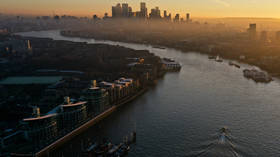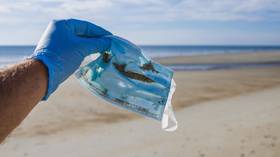Drugs in rivers threaten humans and nature, study warns

More than a quarter out of 285 rivers sampled in an unparalleled global study were found to have levels of “active pharmaceutical ingredients” deemed unsafe for aquatic life. And, researchers conclude, humans are also in danger from the contamination.
The pollution of the world’s rivers with drugs poses “a threat to environmental and human health,” the authors of the paper, published in the journal Proceedings of the National Academy of Sciences, warn.
The most extensive study on the issue to date has seen water samples from more than a thousand sites in 104 countries tested for 61 active pharmaceutical ingredients (APIs). These were gathered by 127 researchers, representing 86 institutions.
The results of the testing were quite alarming, as 258 rivers that were covered in the survey were found to have an unsafe concentration of pharmaceuticals.
Drugs get into fresh water after being taken by people or livestock and then excreted into the sewage systems or leak directly into the environment. Their negative impact on wildlife isn’t fully studied yet, but it’s known, for example, that ingredients in contraceptives may reduce the population of fish, while those in antidepressants were found to make birds such as starlings feed less.
“If I were a fish living in some of these rivers, I’d be worried right now,” lead author Dr John Wilkinson of the University of York told newspaper The Guardian.
People who are swimming in drug-polluted rivers are not in harm’s way, at least for now, according to the study. But the situation poses another, much greater danger to humanity, as the presence of antibiotics in the waterways allows bacteria to develop resistance to this type of medicine, eventually rendering it useless.
“The World Health Organization and UN and other organizations say antimicrobial resistance is the single greatest threat to humanity – it’s a next pandemic,” Wilkinson warned.
In 19% of the sites that were monitored scientists registered a concentration of antibiotics that “exceeded the levels that we’d expect to encourage bacteria to develop resistance,” he added.
The worst drug-polluted rivers were found in low- and middle-income countries, with hotspots located in Lahore in Pakistan, La Paz in Bolivia, and in Addis Ababa, Ethiopia.
“This is most concerning because you have the most vulnerable populations with the least access to healthcare exposed to this,” Dr Mohamed Abdallah of Birmingham University told the BBC.
The only two rivers that turned out to be absolutely clean were discovered in Iceland and Venezuela, with the latter being in an area populated by indigenous people who shun modern medicine.
The two most frequently detected drugs were carbamazepine, prescribed for epilepsy, and metformin, used to treat diabetes. In Africa, anti-malarial medicine, artemisinin, was also often encountered in high concentrations.
There was also lots of so-called "lifestyle consumables" like caffeine from coffee and nicotine from cigarettes, as well as the painkiller paracetamol, in the sampled water, according to the study.
The authors suggested that improvements to wastewater treatment infrastructure in the worst-affected areas, and the promotion of responsible use of drugs, especially antibiotics, could help reduce such pollution in rivers. But even those measures won’t be enough to solve the problem for good, it warns.














